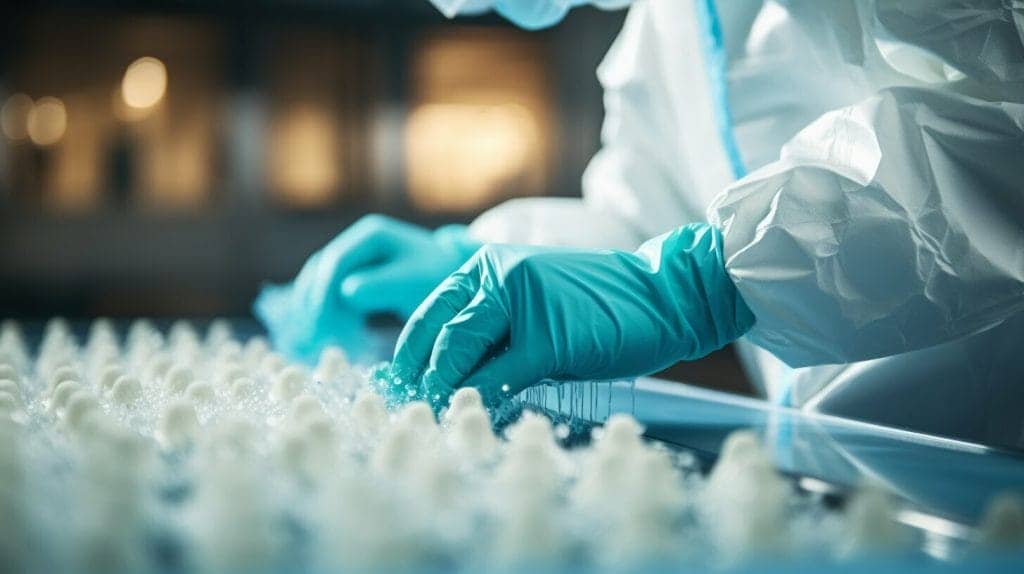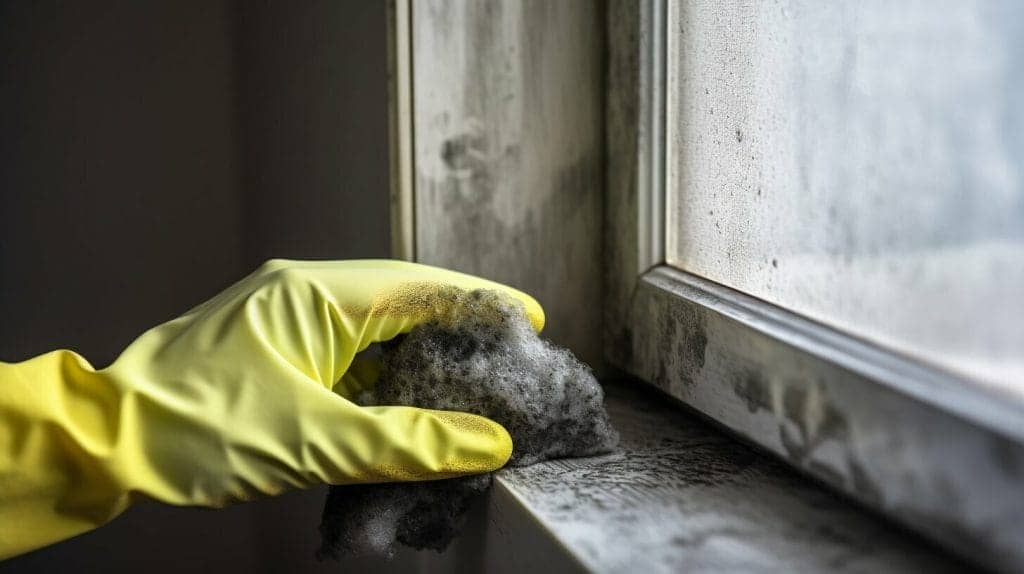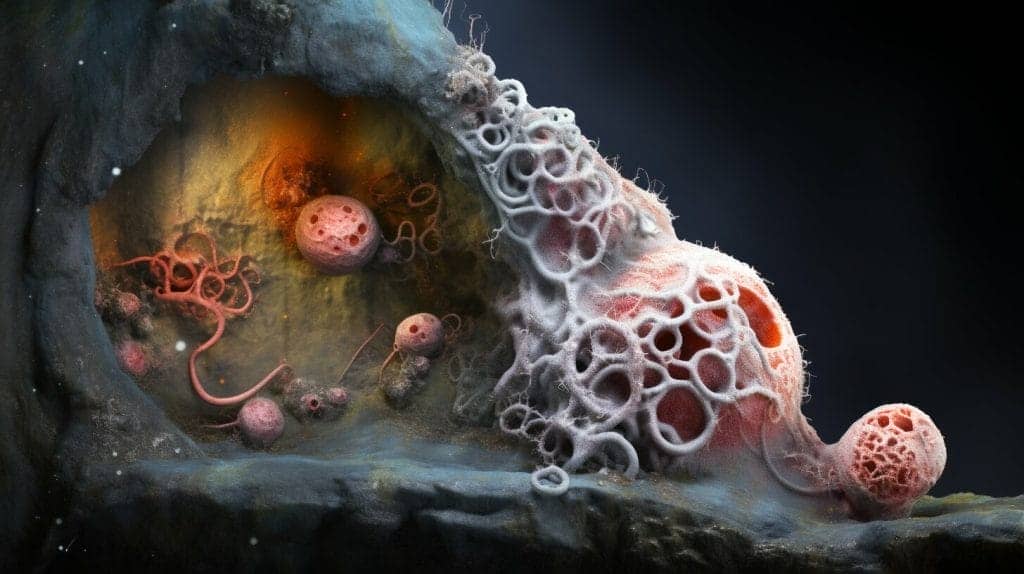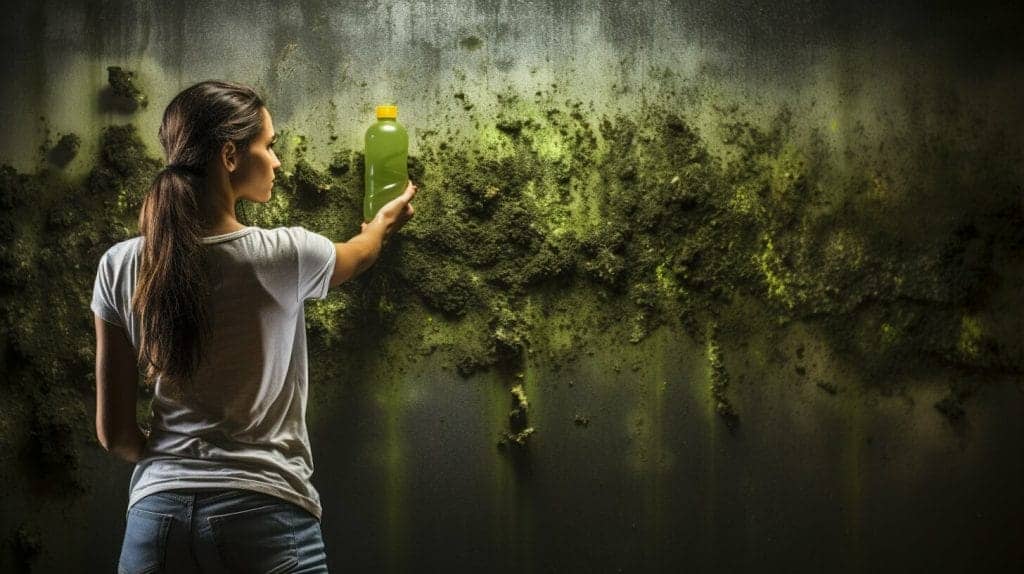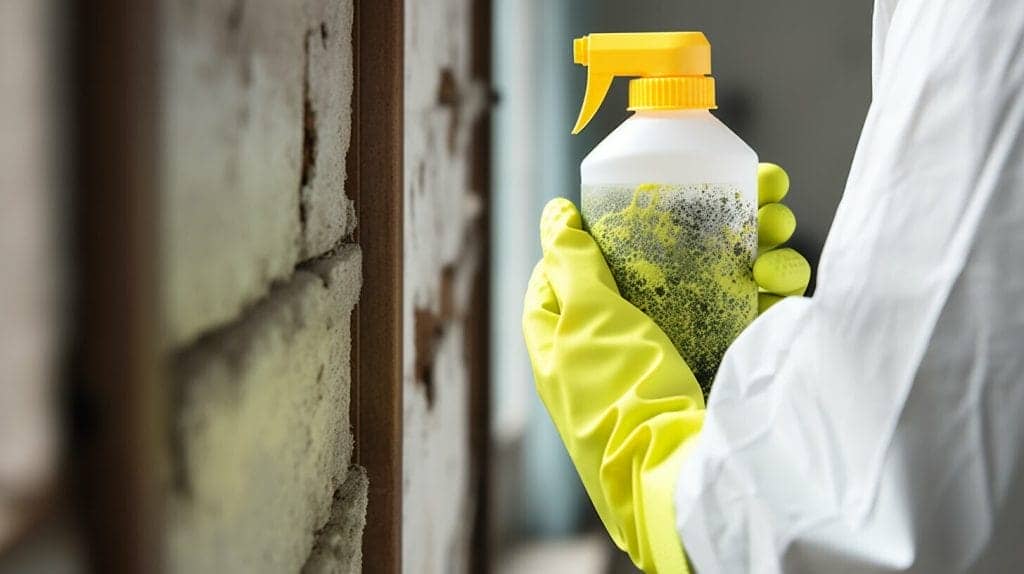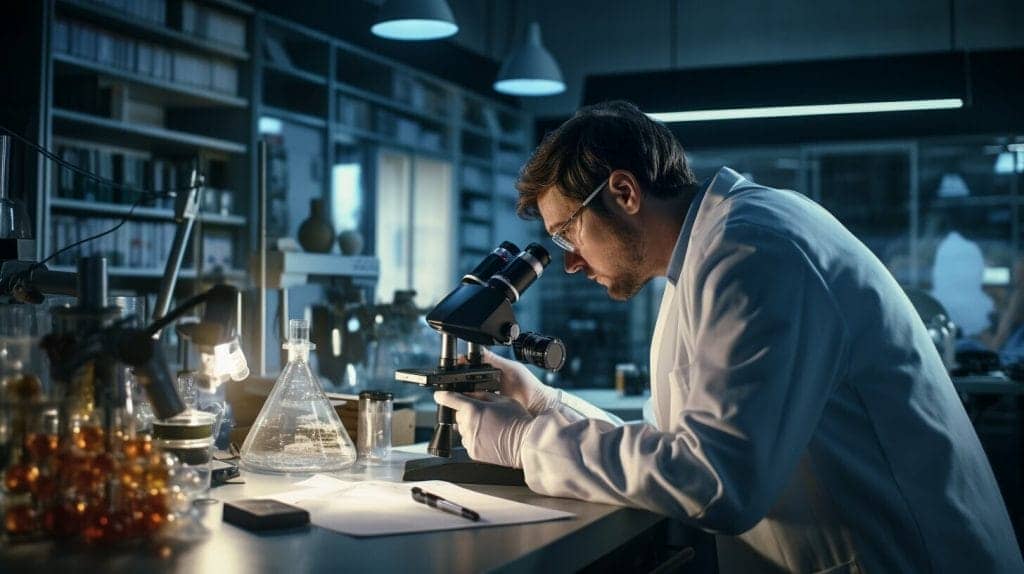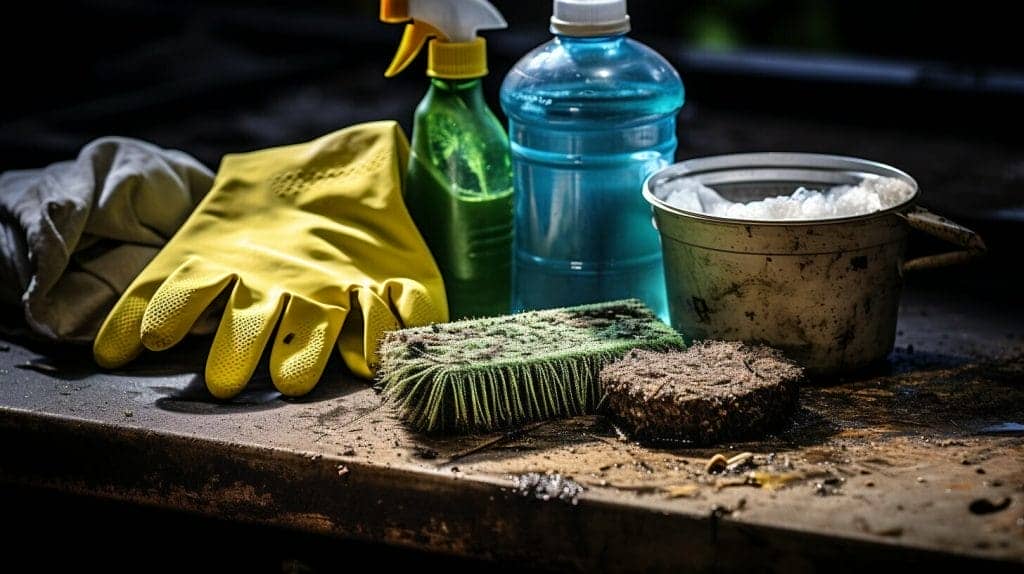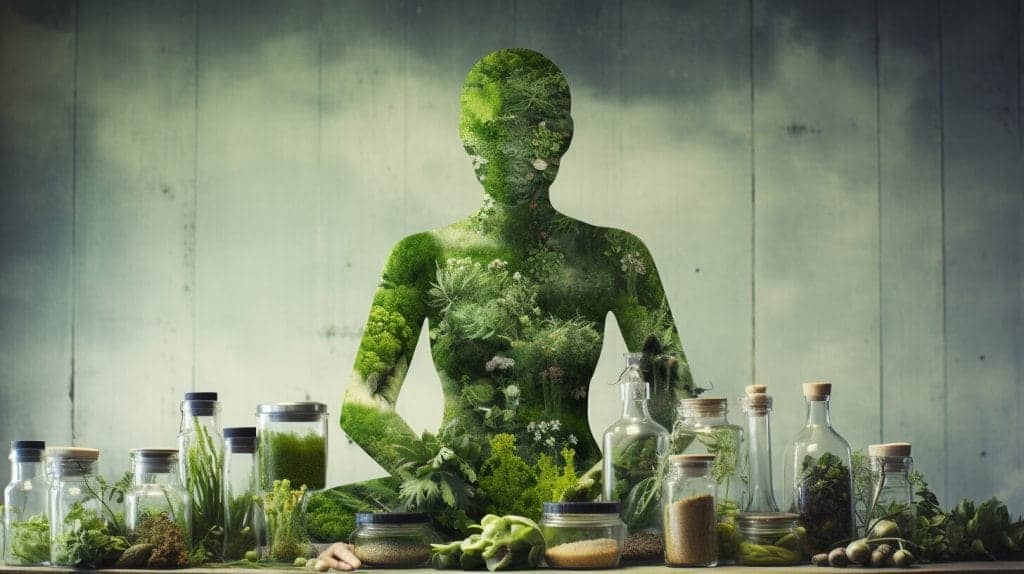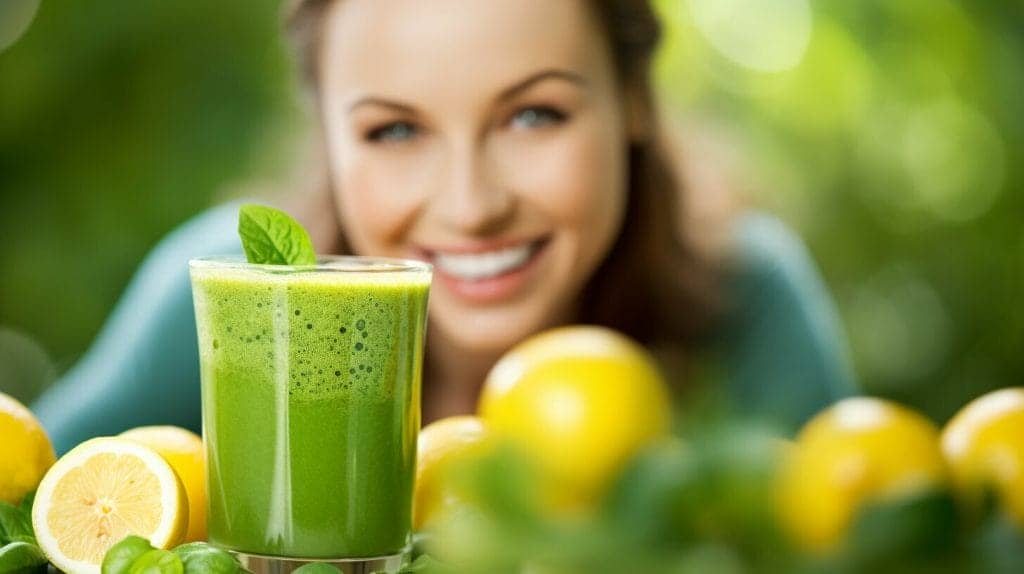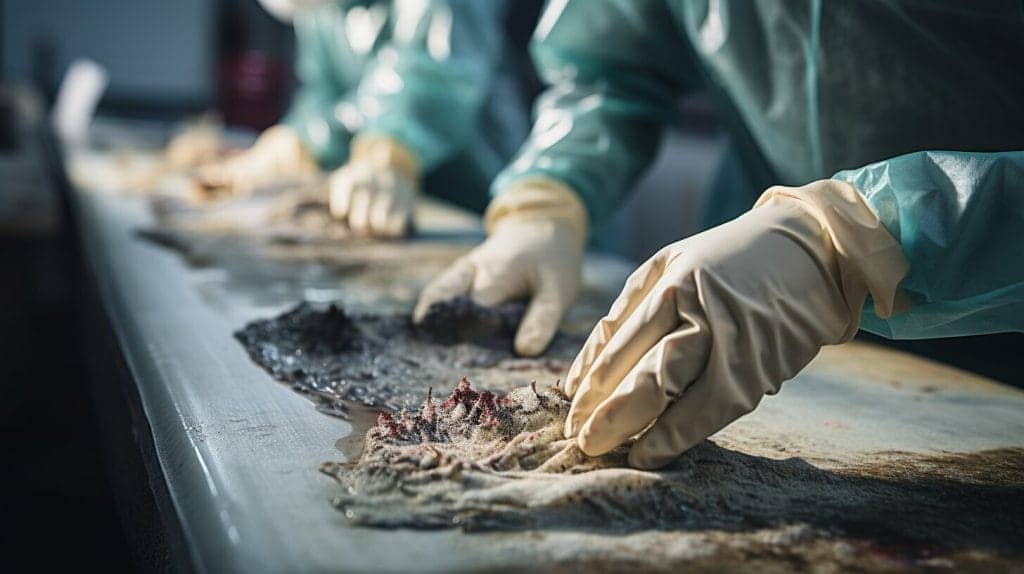One of the most effective ways to recover from mold toxicity is by adopting a plant-based diet. This type of diet is rich in nutrients, antioxidants, and fiber, which can help the body fight inflammation and eliminate toxins. Plant-based diets for mold recovery are becoming increasingly popular, as they offer a natural and holistic approach to healing.
When dealing with mold toxicity, it’s essential to address the root cause of the problem. A plant-based diet can help support the body’s natural detoxification process, which is crucial for eliminating mold toxins. This type of diet is also beneficial for improving gut health, boosting the immune system, and reducing inflammation, which are all critical factors in mold recovery.
Key Takeaways:
- A plant-based diet can support the body’s natural detoxification process
- A plant-based diet is rich in nutrients, antioxidants, and fiber, which are essential for healing
- Improving gut health, boosting the immune system, and reducing inflammation are crucial for mold recovery
Understanding Mold Toxicity and the Recovery Process
Mold toxicity is a serious health concern that can have a wide range of effects on the body. Exposure to toxic mold can cause symptoms such as headaches, fatigue, respiratory issues, and even neurological problems. It can also exacerbate existing medical conditions, such as asthma and allergies.
Recovering from mold toxicity requires a holistic approach that addresses not only the symptoms but also the underlying causes of the mold exposure. This includes removing the source of the mold, improving indoor air quality, and supporting the body’s natural healing processes.
One effective way to support the body’s healing process is through natural remedies and plant-based nutrition. By incorporating healing foods into the diet, individuals can help detoxify the body and boost the immune system.
The Role of Plant-Based Diets in Mold Recovery
A plant-based diet is a powerful tool for promoting healing and recovery from mold toxicity. By nourishing the body with nutrient-dense foods, plant-based diets can help replenish the body’s stores of vitamins and minerals that may have been depleted due to mold exposure. Additionally, plant-based diets are rich in fiber, which can help support detoxification and improve gut health, a crucial aspect of mold recovery.
When designing a plant-based diet for mold recovery, it’s important to focus on incorporating foods that are particularly beneficial for supporting the body’s healing process. These may include:
| Healing Foods for Mold Recovery | Benefits |
|---|---|
| Cruciferous Vegetables (e.g., broccoli, cauliflower) | Rich in sulfur-containing compounds that support liver detoxification |
| Leafy Greens (e.g., kale, spinach) | High in vitamin C and other antioxidants that promote immune function and aid in detoxification |
| Berries (e.g., blueberries, strawberries) | Rich in anthocyanins, which have anti-inflammatory and neuroprotective properties |
| Healthy Fats (e.g., avocado, nuts, seeds) | Provide essential fatty acids that support brain function and help reduce inflammation |
| Herbs and Spices (e.g., turmeric, ginger) | Contain anti-inflammatory compounds that can help reduce the effects of mold toxicity |
It’s important to note that a plant-based diet alone may not be sufficient for complete recovery from mold toxicity. However, it can be a valuable component of a holistic approach to mold recovery that also includes other natural remedies and treatments.
Benefits of a Vegan Diet for Mold Recovery
A vegan diet can offer numerous benefits for individuals recovering from mold toxicity. With its emphasis on whole, plant-based foods, a vegan diet can provide the body with the nutrients it needs to support the healing process.
One key benefit of a vegan diet for mold recovery is that it can help reduce inflammation in the body. Chronic inflammation is a common symptom of mold toxicity and can contribute to a range of health issues. By focusing on anti-inflammatory foods like fruits, vegetables, whole grains, and legumes, a vegan diet can help combat this inflammation and promote healing.
Additionally, a vegan diet can aid in the detoxification process. Many plant-based foods, such as leafy greens, garlic, and cruciferous vegetables, contain compounds that support liver function and assist in the elimination of toxins from the body.
A vegan diet can also promote overall health and wellness. With its emphasis on whole, unprocessed foods, a vegan diet can help individuals maintain a healthy weight, reduce the risk of chronic illness, and improve their energy levels and mood.
Overall, a vegan diet can be an effective and sustainable way to support mold recovery and promote optimal health and wellness.
Plant-Based Meal Plan for Mold Recovery
When recovering from mold toxicity, it is essential to nourish your body with healing foods. A plant-based diet rich in whole foods and low in processed ingredients can provide your body with the vitamins, minerals, and antioxidants it needs to support the recovery process.
Here is a sample meal plan designed to support mold recovery:
| Meal | Food |
|---|---|
| Breakfast | Green smoothie made with spinach, kale, almond milk, and a banana |
| Snack | Apple slices with almond butter |
| Lunch | Quinoa salad with mixed greens, roasted sweet potatoes, chickpeas, and avocado |
| Snack | Carrots and hummus |
| Dinner | Vegan lentil soup with a side of quinoa and steamed broccoli |
Incorporating a variety of colorful fruits and vegetables, whole grains, and legumes into your diet can help strengthen your immune system and support your body’s natural detoxification process. Consider consulting with a registered dietitian to create a personalized meal plan that meets your specific needs.
The Role of Plant-Based Diets in Mold Recovery
Plant-based diets are an essential part of a holistic approach to mold recovery. By incorporating nutrient-dense, detoxifying foods, individuals can support the body’s natural healing abilities and aid in the elimination of toxins.
A plant-based diet is rich in antioxidants, which help combat oxidative stress caused by mold toxicity. Antioxidant-rich foods include colorful fruits and vegetables, such as berries, leafy greens, and cruciferous vegetables like broccoli and cauliflower.
| Healing Foods for Mold Recovery | Benefits |
|---|---|
| Garlic | Has antifungal properties and supports immune function |
| Ginger | Has anti-inflammatory properties and aids in digestion |
| Turmeric | Has anti-inflammatory and antioxidant properties |
| Lemons | Support liver function and aid in digestion |
Incorporating plant-based protein sources, such as beans, lentils, and quinoa, can also support the body’s healing process. These protein sources are rich in fiber, which promotes gut health and aids in the elimination of toxins from the body.
Additionally, following a plant-based diet can help reduce inflammation in the body, which is often exacerbated by mold toxicity. By reducing inflammation, individuals can support their overall health and promote faster healing.
It is important to note that a plant-based diet should be approached in a balanced way to ensure adequate nutrient intake. Consulting with a healthcare professional or registered dietitian can help individuals ensure they are meeting their nutrient needs while following a plant-based diet.
Incorporating Exercise and Stress Reduction Techniques
While a plant-based diet is a crucial component of mold recovery, it’s important not to overlook the role of exercise and stress reduction techniques. Both of these practices are essential for maintaining overall wellness and supporting the body’s natural detoxification processes.
Regular exercise helps to increase circulation and oxygenation throughout the body, which can aid in the elimination of toxins. It also helps to boost the immune system, which is crucial for fighting off infections and illness. Some great forms of exercise for mold recovery include yoga, pilates, and low-impact cardio.
In addition to exercise, stress reduction techniques such as meditation, deep breathing, and visualization can help to calm the mind and reduce the negative effects of stress on the body. Stress can weaken the immune system and make it more difficult for the body to detoxify, so it’s important to find ways to manage it.
“Regular exercise and stress reduction techniques are essential for maintaining overall wellness and supporting the body’s natural detoxification processes.”
By incorporating exercise and stress reduction techniques into a mold recovery plan, individuals can support their body’s healing process and promote overall wellness. It’s important to start slowly and gradually increase intensity or duration of exercise, and to find stress reduction techniques that work best for the individual.
The Importance of Gut Health in Mold Recovery
When recovering from mold toxicity, it is essential to focus on improving gut health. A healthy gut can aid in the elimination of toxins and support the body’s healing process. The plant-based diet recommended for mold recovery is particularly helpful in promoting gut health.
Some of the best foods to improve gut health include:
| Food | Why it’s Helpful |
|---|---|
| Fermented vegetables, such as sauerkraut and kimchi | Contain beneficial bacteria to support digestive health |
| High-fiber fruits and vegetables, such as berries and leafy greens | Promote regular bowel movements and provide prebiotics for healthy gut bacteria |
| Whole grains, such as quinoa and brown rice | Provide fiber and nutrients to support gut health |
In addition to incorporating these foods into your diet, it may be helpful to take a probiotic supplement to further support gut health. It’s important to consult with a healthcare professional to determine the best probiotic for your individual needs.
Overall, improving gut health is crucial for recovering from mold toxicity and maintaining overall wellness. By following a plant-based diet and incorporating foods that promote gut health, you can aid in the body’s healing process and promote long-term health.
The Importance of Gut Health in Mold Recovery
Gut health plays a critical role in mold recovery. The digestive system is responsible for processing nutrients, eliminating toxins, and protecting the body from harmful substances. When the gut is compromised, it can lead to inflammation, weakened immune function, and impaired detoxification.
A plant-based diet is an excellent way to improve gut health and support the body’s natural detoxification processes. Plant foods are rich in fiber, which promotes healthy digestion and the growth of beneficial gut bacteria. Fermented foods like sauerkraut, kimchi, and kefir are also great sources of probiotics, which help restore the balance of good bacteria in the gut.
Additionally, certain plant-based foods have been shown to have anti-inflammatory properties, which can help reduce inflammation in the gut. These include leafy greens, berries, and cruciferous vegetables like broccoli and cauliflower.
It’s important to note that in some cases, an individual’s gut health may be compromised to the point where specialized treatment is necessary. If you suspect that your gut health is compromised, it’s recommended to consult with a healthcare professional to determine the best course of action.
Detoxification and Mold Recovery
Detoxification plays a crucial role in mold recovery. The body’s natural detoxification process involves the liver, kidneys, and lymphatic system working together to eliminate toxins. However, when exposed to mold toxins, the body may require additional support to effectively eliminate these harmful substances. A mold detox diet and natural remedies can aid in this process.
The following are some effective natural remedies for mold detoxification:
| Remedy | Benefits |
|---|---|
| Activated charcoal | Binds to toxins and helps eliminate them from the body |
| Bentonite clay | Binds to toxins and supports gut health |
| Chlorella | Supports liver health and detoxification |
| Milk thistle | Supports liver function and aids in toxin elimination |
| Essential oils (e.g. tea tree, eucalyptus) | Antifungal and antimicrobial properties aid in detoxification and respiratory health |
A mold detox diet typically focuses on whole, organic, and unprocessed foods that are low in sugar and high in fiber, protein, and healthy fats. Some key components of a mold detox diet include:
- Non-starchy vegetables (e.g. leafy greens, broccoli, cauliflower)
- Low-sugar fruits (e.g. berries, citrus)
- Healthy fats (e.g. avocado, nuts, seeds, olive oil)
- Protein sources (e.g. beans, lentils, quinoa, wild-caught fish)
- Foods rich in antioxidants and anti-inflammatory compounds (e.g. turmeric, ginger, green tea)
- Fermented foods (e.g. sauerkraut, kimchi, kefir) to support gut health
It is important to remember that detoxification can be a gradual process. It may take time for the body to eliminate all of the mold toxins and for symptoms to improve. Additionally, it is crucial to support the body through this process with adequate hydration and rest.
The Importance of Maintaining a Long-Term Plant-Based Lifestyle for Mold Recovery
While plant-based diets and natural remedies can be incredibly effective in supporting mold recovery, it’s important to maintain a long-term commitment to this lifestyle in order to achieve lasting results.
One of the key benefits of a plant-based diet is its ability to support overall health and wellness. By incorporating a variety of nutrient-dense, detoxifying foods, individuals can not only support their mold recovery but also prevent future health issues. This includes reducing the risk of chronic illnesses such as heart disease, diabetes, and cancer.
However, making a long-term commitment to a plant-based lifestyle can be challenging. To stay on track, it can be helpful to set realistic goals and establish a support system. This might include connecting with other individuals who are also following a plant-based diet, finding a reliable source of nutritious recipes, and seeking guidance from healthcare professionals.
In addition to a plant-based diet, individuals can also incorporate stress-reduction techniques and exercise into their mold recovery plan. These practices can support overall wellness and aid in the detoxification process. Practicing mindfulness, meditation, or deep breathing exercises can be especially helpful in managing stress levels.
In conclusion, maintaining a long-term commitment to a plant-based lifestyle can have significant benefits in supporting mold recovery and overall health. By prioritizing nutrient-dense, detoxifying foods and incorporating stress-reduction techniques and exercise, individuals can achieve optimal healing and wellness.
Book a Consultation at Oasis Medical Institute
To receive personalized and holistic Mold Toxicity treatment, readers are encouraged to book a consultation at Oasis Medical Institute in Tijuana, Mexico. The institute’s integrative approach to medicine for Mold Toxicity is provided by Dr. Francisco Contreras MD, a renowned expert in the field.
Those interested in scheduling a consultation can call 866-868-1992 or visit the Oasis Medical Institute website for more information.
Conclusion
Plant-based diets and natural remedies can be powerful tools in the healing process for those suffering from mold toxicity. By nourishing the body with healing foods, reducing stress, and supporting gut health, individuals can aid in the detoxification process and support overall wellness.
It is important to maintain a long-term plant-based lifestyle for continued mold recovery and optimal health. By incorporating exercise, stress reduction techniques, and natural remedies, individuals can further support their body’s healing process.
For personalized and holistic Mold Toxicity treatment, individuals can book a consultation at Oasis Medical Institute. Dr. Francisco Contreras MD and his team of experts provide integrative medicine for Mold Toxicity, including plant-based nutrition and other holistic treatments.
Don’t wait to start your journey to health and wellness. Embrace a plant-based lifestyle and natural remedies for mold recovery today.
FAQ
Q: What is the role of plant-based diets in mold recovery?
A: Plant-based diets play a crucial role in promoting healing and recovery from mold toxicity. These diets are rich in nutrient-dense foods that support the body’s detoxification process and strengthen the immune system.
Q: What are the benefits of following a vegan diet for mold recovery?
A: Following a vegan diet can have numerous benefits for mold recovery. It helps eliminate potential allergens and irritants found in animal products, reduces inflammation in the body, and provides essential nutrients that support overall health and wellness.
Q: Can you provide a sample plant-based meal plan for mold recovery?
A: Certainly! Here is a sample plant-based meal plan that is designed to support mold recovery:
– Breakfast: Green smoothie with spinach, banana, almond milk, and chia seeds
– Lunch: Quinoa salad with mixed vegetables and avocado dressing
– Snack: Raw almonds and a piece of fruit
– Dinner: Baked tofu with roasted vegetables and brown rice
– Dessert: Coconut yogurt with berries and a sprinkle of hemp seeds
Q: What holistic treatments are available at Oasis Medical Institute for mold recovery?
A: Oasis Medical Institute offers a range of holistic treatments for mold recovery. These include integrative medicine, nutritional therapy, detoxification protocols, and stress reduction techniques. Their holistic Mold Toxicity treatment program is designed to address the root causes of mold illness and promote healing naturally.
Q: What are some natural remedies that can support mold recovery?
A: There are several natural remedies that can support mold recovery. These include herbal supplements, essential oils, probiotics, and specific detoxifying foods such as cilantro and garlic. These remedies can aid the body in eliminating toxins and promote healing.
Q: Why is gut health important in mold recovery?
A: Gut health plays a vital role in mold recovery as it affects the body’s ability to detoxify and heal. A plant-based diet can help improve gut health by providing fiber, prebiotics, and probiotics that support a healthy microbiome and enhance the body’s natural detoxification process.
Q: How does detoxification contribute to mold recovery?
A: Detoxification is a crucial aspect of mold recovery as it helps the body eliminate toxins accumulated from mold exposure. A mold detox diet, combined with natural remedies and practices, supports the liver, kidneys, and lymphatic system in effectively removing toxins and promoting overall healing.
Q: Can a plant-based lifestyle be sustained long-term for mold recovery?
A: Yes, a plant-based lifestyle can be sustained long-term for mold recovery. In fact, maintaining a plant-based diet offers ongoing benefits for overall health and wellness. It is important to incorporate variety, seek professional guidance, and listen to your body’s needs to ensure optimal nourishment and healing.
Q: How can I book a consultation at Oasis Medical Institute for mold recovery?
A: To book a consultation at Oasis Medical Institute for personalized and holistic Mold Toxicity treatment, please call 866-868-1992. Their team of experts will guide you through the process and provide the necessary support and care.
Dr. Francisco Contreras, MD is a renowned integrative medical physician with over 20 years of dedicated experience in the field of integrative medicine. As the Medical Director of the Oasis of Hope Hospital in Tijuana, Mexico, he has pioneered innovative treatments and integrative approaches that have been recognized globally for the treatment of cancer, Lyme Disease, Mold Toxicity, and chronic disease using alternative treatment modalities. Dr. Contreras holds a medical degree from the Autonomous University of Mexico in Toluca, and speciality in surgical oncology from the University of Vienna in Austria.
Under his visionary leadership, the Oasis of Hope Hospital has emerged as a leading institution, renowned for its innovative treatments and patient-centric approach for treating cancer, Lyme Disease, Mold Toxicity, Long-Haul COVID, and chronic disease. The hospital, under Dr. Contreras's guidance, has successfully treated thousands of patients, many of whom traveled from different parts of the world, seeking the unique and compassionate care the institution offers.
Dr. Contreras has contributed to numerous research papers, articles, and medical journals, solidifying his expertise in the realm of integrative medicine. His commitment to patient care and evidence-based treatments has earned him a reputation for trustworthiness and excellence. Dr. Contreras is frequently invited to speak at international conferences and has been featured on CNN, WMAR2 News, KGUN9 News, Tyent USA, and various others for his groundbreaking work. His dedication to the medical community and his patients is unwavering, making him a leading authority in the field.
Contreras has authored and co-authored several books concerning integrative therapy, cancer, Lyme Disease and heart disease prevention and chronic illness, including "The Art Science of Undermining Cancer", "The Art & Science of Undermining Cancer: Strategies to Slow, Control, Reverse", "Look Younger, Live Longer: 10 Steps to Reverse Aging and Live a Vibrant Life", "The Coming Cancer Cure Your Guide to effective alternative, conventional and integrative therapies", "Hope Medicine & Healing", "Health in the 21st Century: Will Doctors Survive?", "Healthy Heart: An alternative guide to a healthy heart", “The Hope of Living Cancer Free”, “Hope Of Living Long And Well: 10 Steps to look younger, feel better, live longer” “Fighting Cancer 20 Different Ways”, "50 Critical Cancer Answers: Your Personal Battle Plan for Beating Cancer", "To Beat . . . Or Not to Beat?", and “Dismantling Cancer.”



